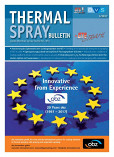Shielding of the spraying jet during the arc sprayingof NiTi in order to reduce the oxide formation
Authors: Prof. Dr.-Ing. Dipl.-Wirt.Ing. Wolfgang Tillmann, Dipl.-Ing. Mohamed Abdulgader, M. Sc. Christopher Schaak, B. Sc. Jonas Zajaczkowski
As a rule, the process-induced, intensive heat input into the spraying material during arc spraying in the presence of air oxygen (atomising gas) leads to the oxidation of the sprayed particles. Substantially increased oxidation may arise particularly in the case of oxygen-affine or reactive materials such as titanium
or titanium alloys. The oxidation alters the coating morphology and the coating properties significantly and should thus be reduced to a minimum. Practised approaches to solving this problem are expensive vacuum spraying processes. In our own scientific studies, an attempt is thus made to achieve low-oxide NiTi coatings by means of conventional, atmospheric arc spraying by applying various concepts for the shielding of the spraying jet and using argon as the atomising gas. In this respect, investigations are conducted into the effects of the shielding concepts on the coating composition and microstructure. The various shielding concepts are compared experimentally. Optimum shielding concepts for manufacturing pseudoelastic NiTi coatings are derived from the obtained findings.
Pages: 36 - 42







Order this article as a PDF for 8.00 Euro. Send us a short e-mail with your details.
An active subscription enables you to download articles or entire issues as PDF-files. If you already are a subscriber, please login. More information about the subscription








